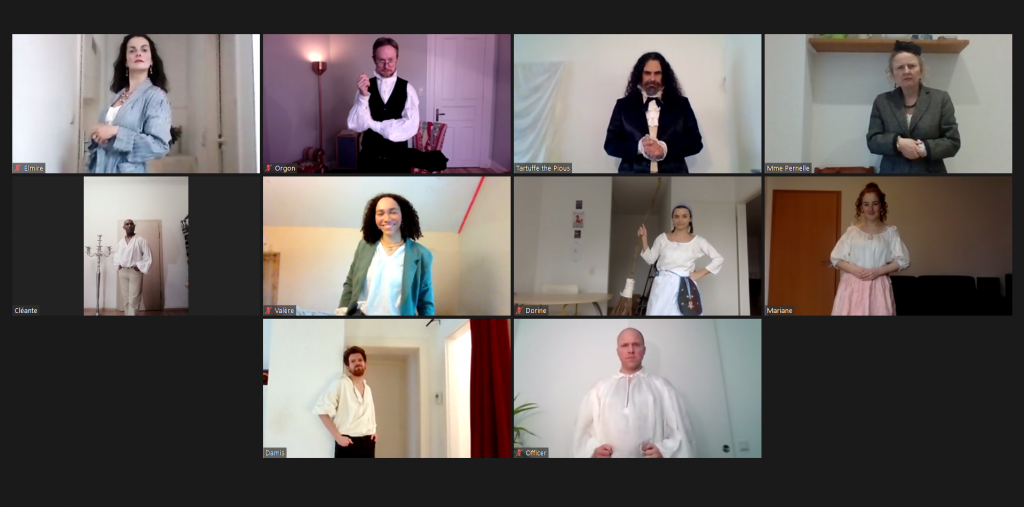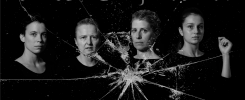No one shall know our joys, save us alone, And there is no evil til the act is known.
Tartuffe – Act IV.5UPDATE: It is with a heavy heart that we must announce the cancellation of our production of Tartuffe. Due to the continued Covid-19 restrictions in Frankfurt, we are unable to perform this show for a live audience as intended. We want to thank everyone for their support and most importantly the cast and crew for their hard work and dedication to this project throughout many months of uncertainty. While it continues to be a challenging time for the theatre, we remain optimistic that one day soon we will be able to once again share stories in the traditional format we know and love. Until then, stay safe and healthy.
Molière’s comedic masterpiece is about “The Cult of Personality”, or what happens when a con-artist attempts to fool an entire family.
This timeless comedy is a story that highlights how absurd a family becomes when they are fooled and manipulated by the charlatan, Tartuffe. Using Richard Wilbur’s poetic translation, traditions from Volkstheatre and Commedia dell’arte, Shakespeare Frankfurt will take you into a world of hypocrisy and humor where the question becomes: How easily do we trust what we hear and at what point do we begin to take action when we know we have been deceived. Molière created one of the great comedies of all time by taking many of the stock characters from Commedia dell’arte and transforming them into multifaceted personalities who are either seduced, conned or vilified by the lecherous Tartuffe.
Director – Elisa von Issendorff
ensemble
click image for role & bio
-
Varvara Pomoni
Elmire
Varvara comes from Athens, Greece. She has trained in various theatre institutions in Germany and in England on Meisner Technique, Improvisation, Shakespeare's Text and on Meyerhold's Biomechanics & Physical Theatre. This is her seventh production with Shakespeare Frankfurt having played the roles of Lady Macbeth (Macbeth) and Emilia (Othello) in 2019. Most recently, she performed in Huck Finn for the English Theatre Frankfurt and acted in Shakespeare Frankfurt's film Spiritus Vitae - The Breath of Life.
-
Thomas Lehmann
M Loyal/Officer
Thomas (Tom) Lehmann is a French palaeontologist, born in Alsace, where he nursed his love for old bones and theatre. After several experiences on stage as a teenager, Tom joined the LUDI Poitiers (a French Comedy Sport group) during his studies, and let “improv” enter his life. After peregrinating overseas, he moved to Frankfurt in 2008 to work at the Senckenberg Museum. Between fieldtrips to Kenya, he goes on stage to play in French or English, first with the Sidekicks Improvisational Comedy group, and then in several plays with FEST, the LOFT, Derdiedascalies and Shakespeare Frankfurt. With Tartuffe, Tom realizes a long-awaited dream of his: to perform in a French classic play. Tom is a wine, cheese, Star Trek, role playing, and Africa addict. He knows everything about aardvarks.
-
Susanna Mauer
Dorine
Susanna Mauer is a 22-year old actress and singer currently based in Frankfurt. Her love for theatre developed at an early age and she began formal voice, dance and acting training when she was just 6 years old. After spending her early childhood working and training in the UK, she moved to Germany with her family and received an acting scholarship from the Peter Ustinov Foundation. As a teenager she appeared in several productions at the English Theatre Frankfurt and at the Gallus Theater Frankfurt. Susanna has spent the last three years studying English Literature at the University of Cambridge, where she was an active member of the student drama scene and participated in 35 productions alongside finishing her degree. For the past two (pre-covid) summers she has worked and performed at the Edinburgh Fringe Festival. This is her first production with Shakespeare Frankfurt.
-
PJ Escobio
Tartuffe
Some of his favorite classical roles performed include: Theseus in A Midsummer Night’s Dream, Banquo and MacDuff in MacBeth, Don Pedro in Much Ado About Nothing, Caliban in The Tempest, Agamemnon in The Orestia, Kleon in Antigone, Hermes in Ion, Archer in The Beaux Stratagem. Some of his contemporary work includes: Scrooge in Dickens by Candlelight, Einstein in Pablo Picasso at the Lapin Agile, Father Matteo in Zorro. Some film credits include Bluebeard in Blue Widow and Leontes in Spiritus Vitae: The Breath of Life as well as numerous animated shorts. He holds an M.F.A. in Acting and Directing from the University of Missouri- Kansas City.
-
Isabella Pizarro
Valère
Isabella Pizarro is a senior at the WHS. This is her first production with Shakespeare Frankfurt, and she has learned a lot from everyone in the team. Isabella has previously performed on stages such as the Frankfurt English Speaking Theatre (FEST), at the Amelia Earhart Playhouse in Wiesbaden as well as her High school. Isa hopes that this play will take the audience's mind off of worries from today’s world, if even just for a while.
-
Emma Teitge
Mariane
Emma is a Frankfurt native and just finished her first year in the BA (Hons) Acting programme of the Institute of the Arts Barcelona. She has been part of Shakespeare Frankfurt since the production of “An Enemy of the People” by Henrik Ibsen in the International Theatre Frankfurt in 2018 and was also part of Shakespeare in the Garden in “Macbeth” as a witch in 2019. She appeared in Shakespeare Frankfurt’s film “Spiritus Vitae- The Breath of Life” in the role of Lysander in 2020. She has been acting, singing and dancing in a musical theatre school for over 13 years and has been part of the production of “Je t’aime, Je t’aime“ at Schauspiel Frankfurt. She was also part of international Stagecoach musical productions such as “Joseph and the Amazing Technicolor Dreamcoat“, “Little Shop of Horrors“ and “Footloose“ in London, England.
-
Michael Kinzer
Damis
Michael has been acting since he was a child. With the touring Zettels Theater company he performed in a number of German Shakespeare productions, including Richard III where he played the title role. In 2019 he starred as another infamous king: Macbeth, his fifth production with Shakespeare Frankfurt, after having played Ariel in The Tempest, Sebastian in Twelfth Night, Bottom in A Midsummer Night’s Dream and Dr. Stockmann in Ibsen’s An Enemy of the People. His other acting credits include Yasmina Reza’s Art, Martin McDonagh’s The Pillowman and Martin Heckmanns’ one-person play Finnisch, for which he received the Best Actor award at the Freispiel Festival in Freiburg. In 2020 he co-developed, edited and acted in Shakespeare Frankfurt’s first feature film Spiritus Vitae – The Breath of Life and portrayed the mentally unstable composer Robert Schumann in Theater 3D’s production Dichterliebe which won the jury award at the MADE Festival in Fulda.
-
Anna Rogers
Mme Pernelle
Anna’s interest in theatre started as a child, taking acting lessons and participating in various drama competitions, later passing exams of the Poetry Society and LAMDA (London Academy of Music and Dramatic Art). She has been working freelance since 2008. As well as voiceover work and acting, she has experience directing and playwriting. Her plays have been performed in Europe and the USA. She has performed in London, Frankfurt and other European locations, including at the Edinburgh Fringe Festival. Previous roles with Shakespeare Frankfurt are Hovstad in Enemy of the People (Ibsen), Ross in Macbeth (Shakespeare) and Hecuba in Trojan Women (Euripides).
-
Ciaran Corsar
Orgon
Ciaran is originally from Northern Ireland and began his career in the Arts working with the Ulster Youth Theatre at the Lyric Theatre, Belfast as Kittel in the award winning production of Ghetto. In 1999 he graduated from Royal Holloway College with a Drama and Theatre Studies degree. He was awarded a Scholarship by The Stage Newspaper and continued his training at The Academy Drama School. On leaving The Academy, he embarked on a number of UK Theatre Tours and performed in numerous venues throughout London. 2013 saw Ciaran move first to Bochum and then onwards to Switzerland. It was here that he helped establish The White Rabbit Theatre Company, producing English Language Theatre for the local community. In 2019 the company produced the European Premier of The Gospel According to Thomas Jefferson, Charles Dickens and Count Leo Tolstoy: Discord by Scott Carter and performed at The Edinburgh Fringe Festival.
-
Keith Wilson
Cléante
A native Tennessean currently residing in Germany has been successfully working as a singer, actor, dancer and choreographer. Keith has a diverse educational background with Diplomas in Musical Theater (American Musical Dramatics Academy), Speech & Theater (Austin Peay State Univ.), Elementary Education (Austin Peay State Univ.) and ESL Training Certification (Cambridge University, England). Keith has performed nationally and internationally in the German Productions of “The Lion King,” “Starlight Express,” “La cage Aux Folles,” “Hair,” “Jesus Christ Superstar,” and “Dream Girls (in concert).” European productions of the opera “Porgy and Bess” Rome Opera, Theatro Bellini, Semeper Oper, Frankfurt Opera, Magnetic Opera Festival, Italy, Dahala Opera Festival, Sweden and Japan Tour in Tokeyo and Osaka. Choreography success: Song and dance (Landestheater Eisenach Germany, Some Like It Hot (Anhaltisches Theater Dessau), La Cage Aux Folles (Ass. Chore./Dance Captain). Ain’t misbehaving (US), Jesus Christ Superstar (US). US Youth Production as Choreographer for Will Rogers Follies, Grease, Once on this Island, Little Shop of Horrors, and Guys and Dolls. Keith is a member of AEA and have performed in Equity Production such as “Ain’t Misbehaving”, Big River, La Cage Aux Folles, Guys and Dolls, Five Guys Named Mo, Anything Goes, Sophisticated Ladies, and starred as Tony Witcomb in “Shear Madness” and the Kennedy CTR.
-
Elisa von Issendorff
Director
Elisa began her involvement with English-language theater at the age of seventeen with the English Dramatic Society at University Erlangen-Nuremberg. She has performance experience as an actress and singer and directs a student choir. From 2018 to 2019, she was musical director for two musical productions, “Tone Death” and “College Collage,” of the Chaincourt Theatre Company and contributed music to the production of “The Scarecrow.” She also contributed music and worked as the music director for Shakespeare Frankfurt’s production of “Trojan Women” in February 2020. “Tartuffe” is her third production with Shakespeare Frankfurt. This marks her first time directing a full-length play. Since 2018, she has been a surtitles manager at the Frankfurt Opera and works as assistant dramaturge for individual productions. She is a student of theatre, film and media studies at Goethe University Frankfurt.
Elisa von Issendorff
Director
crew
click image for role & bio
-
Dorothée Zapf
Stage Manager
Doro (she/her) is a 23-year-old BA student at Goethe University Frankfurt. Her interest in theatre emerged at an early age: She was an actor for the theatre group in her hometown before shifting her focus on production work at the age of 13. At university, she has been a member of The Chaincourt Theatre Company for several semesters. As such, Doro has worked as the stage manager and rehearsal assistant for two original musical renditions, Tone Death and College Collage, and for the plays The Scarecrow and Machinal. This is her first production with Shakespeare Frankfurt.
-
Elena Lenk
PA & Props Master
My name is Elena (she/her). Born and raised in FFM Nordend, I moved to Bristol and then Canterbury to pursue my theatrical studies. I thrive in creative environments and have been working with/in the theatre for over 10 years! I have worked in most production and performance roles/areas and FINALLY found my niche in a School of Arts Workshop whilst neck deep in paper-mache! I one day hope to work as a dramaturg or PROPfessional Prop Maker (sorry – I should mention another passion of mine are puns). My influences range anywhere from David Bowie to Team Starkid and I would say my personal aesthetic and style lies somewhere in between them. I am ecstatic to have found my way to SF in October 2020 and am more than excited to join the company as a production assistant and Prop master.
-
Lena Langenkamp
Costume Design
Lena is 24 years old and currently studying in Frankfurt. In the past they have done costume and production design for their university theatre group and are planning to pursue it as a career in the future. They try to be as sustainable as possible and source most materials second hand. In their free time they like making art (currently really into mixed media and linoprint), overanalyzing media and annoying their flatmate with theories and rewrites. It is their dream to one day live in a house with a big garden, cats, and chickens.
ABOUT THE PLAY | DIRECTOR’S NOTE
Molière’s comedies reflected his times and his audience. The rising bourgeois and the urbanized noble in 17th century France enjoyed a society whose customs and practices grew in sophistication. The more that men and women stepped away from the realities of daily life, the more they moved in an abstracted world, reflecting upon the business of living together. It was a society that valued personal quality and distinction and pursued them in both theory and practice. A study of social accomplishment emerged in the concept of the honnête homme. Honnête signalled social accomplishment in dress, manners or conversation, and explained the individual’s ability to please. The resulting theatricality of social living made Molière’s audience more sensitive to the possibilities of theater. Molière’s comedies juxtapose this society with the comedic elements of the street theatre – French Farce and Italian Commedia dell’arte: Stereotypical characters, master-servant conflicts, quick changes in tempo and, most importantly, physicality.
In “Tartuffe,” Molière relates physicality and speech to questions of truth and lie. Tartuffe has mastered full mimicry of this society not in dress or manners but in conversation. His beautiful speeches keep Orgon under his spell and almost seduce Elmire. Language can fool some but not all: The rest of the family see Tartuffe for who he is. Especially Dorine, the wise maid – an archetypical character of the Commedia dell’arte – can’t be tricked. Orgon, however, won’t hear the countless accounts of Tartuffe’s crimes; it is only physical evidence that reveals the truth.
Theater during a pandemic is not easy. At a time when humor is most needed, performing comedies on a stage, in front of an audience, is impossible. With Molière’s “Tartuffe” – a play in which physicality and liveness are so vital for storytelling – we are faced with the task of rehearsing and performing online, each actor from their homes. However difficult this was, we found great joy in exploring the text and mastering the art of socially distanced physicality, proving once again that theater can be done everywhere.
synopsis
ACT I
Mme Pernelle leaves her son Orgon’s house. She despises the family for not living a pious and honest life. She believes that Tartuffe, a religious man her son has recently taken in, might be able to save the family. Orgon returns from a short trip. His wife’s brother Cléante questions him regarding his daughter Mariane’s engagement to Valère.
ACT II
Orgon reveals to Mariane that she is to marry Tartuffe. Dorine, her maid, vehemently protests but is not heard. Dorine confronts Mariane on this matter, as Valère enters. Valère and Mariane engage in a heated argument about her supposed engagement to Tartuffe. Dorine can resolve all issues between them and reveals her ideas to stop Orgon’s plan.
ACT III
Damis, Orgon’s son, takes matters into his own hands. He wants to surprise Tartuffe with Orgon’s wife Elmire, whom Tartuffe has laid his eyes on. Elmire cleverly offers Tartuffe not to tell Orgon about his advances if he promises to support the marriage of Mariane and Valère. Damis interrupts them and reveals Tartuffe’s villainous scheme to Orgon. Tartuffe pleads for forgiveness. Blinded by Tartuffe’s supposed piousness Orgon disinherits his son and makes Tartuffe his only heir.
ACT IV
Cléante implores Tartuffe to change Orgon’s mind about the inheritance. Orgon presents Mariane the marriage contract – she is devastated. Elmire steps in and offers to show Orgon that Tartuffe is an imposter. In Orgon’s presence, she seduces Tartuffe and exposes his true lecherous character. Orgon is finally convinced. Tartuffe threatens to ruin the family and leaves.
ACT V
Tartuffe possesses documents that implicate Orgon in political crimes. Damis returns and offers to kill Tartuffe. Mme Pernelle refuses to believe the rumors. With the whole family assembled, a bailiff delivers a notice of eviction. Valère storms in. He warns that Orgon will be arrested and offers to help him flee the country. As Orgon turns to leave, Tartuffe stops him. He orders a police officer to carry out his duty. The officer arrests Tartuffe and explains to the stunned family that the King has wisely seen through Tartuffe’s charade and therefore pardons Orgon. Orgon happily reinstates Mariane’s and Valère’s engagement.
donate to shakespeare frankfurt
If you are enjoying our work, please consider making a donation to help us continue to provide our community with the rich, detailed and timeless stories portraying the human experience. If you have any questions regarding your donation, please contact Varvara Pomoni.



